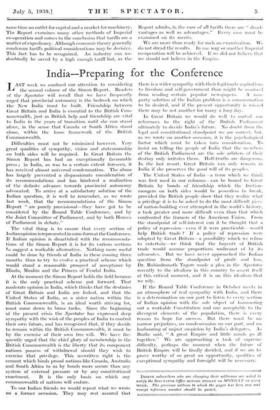India—Preparing f or the Conference
T AST week we confined our attention to considering -1-4 the second volume of the Simon Report. Readers of the Spectator will recall that we have frequently urged that provincial autonomy is the bedrock on which the New India must be built. Friendship between Great Britain and India is essential to the British Com- monwealth, just as British help and friendship arc vital to India in the years of transition until she can stand alone, in the sense that Canada or South Africa stand alone, within the loose framework of the British Commonwealth.
Difficulties must not be minimized however. Very great qualities of sympathy, vision and statesmanship on both sides will be required. In Great Britain the Simon Report has had an exceptionally favourable press ; in India, as was to a certain extent foreseen, it has received almost universal condemnation. The abuse has largely prevented a dispassionate consideration of its recommendations and has hindered a realization of the definite advance towards provincial autonomy advocated. To arrive at a satisfactory solution of the Indian question, it is well to remember, as we wrote last week, that the recommendations of the Simon Report " are purely provisional—they have got to be considered by the Round Table Conference, and by the Joint Committee of Parliament, and by both Houses of Parliament in debate."
The vital thing is to ensure that every section of Indianopinion is represented in some format the Conference. If Indian opinion is dissatisfied with the recommenda- tions of the Simon Report it is for its various sections to suggest a workable alternative. Nothing more useful could be done by friends of India in these coming three months than to try to evolve a practical scheme which would stand a reasonable prospect of acceptance by Hindu, Muslim and the Princes of Feudal India.
At the moment the Simon Report holds the field because it is the only practical scheme put forward. That moderate opinion in India, which thinks that the destinies of Great Britain and India are linked, and that the United States of India, as a sister nation within the British Commonwealth, is an ideal worth striving for, must come down to brass tacks. Since the beginning of the present crisis the Spectator has expressed deep sympathy with the wish of the peoples of India to control their own future, and has recognized that, if they decide to remain within the British Commonwealth, it must be by the exercise of their own free will. We have fre- quently urged that the chief glory of membership in the British Commonwealth is the liberty that its component nations possess of withdrawal should they wish to exercise that privilege. This unwritten right is the cement which binds proud nations like Canada, Australia and South Africa to us by bonds more secure than any system of external pressure or by any constitutional
enactment. It is the only basis on which any commonwealth of nations will endure.
To our Indian friends we would repeat what we wrote on former occasion. They may rest assured that there is a wider sympathy with their legitimate aspirations to freedom and self-government than might be assumed
from reading certain popular newspapers. A non- party solution of the Indian problem is a consummation to be desired, and if the present opportunity is missed there may be not another for many a long day.
In Great Britain we would do well to curtail mu references to the right of the British Parliament ultimately to decide India's future. No doubt from the legal and constitutional standpoint we are correct, but, as we wrote on another occasion, it is the psychological factor which must be taken into consideration. To insist on telling the people of India that the members of the British Parliament are the sole arbiters of their destiny only irritates them. Half-truths are dangerous. In the last resort, Great Britain can only remain in India if she preserves the good will of its peoples.
The United States of India—a term which we think was first used in our columns—can be bound to Great Britain by bonds of friendship which the frictiou- mongers on both sides would be powerless to break, provided the British people show that they realize what a privilege it is to be asked to do the most difficult piece of nation-building ever attempted in the world's history, a task greater and more difficult even than that which confronted the framers of the American Union. From the standpoint of self-interest can it be thought that a policy of repression—even if it were practicable—would. help British trade ? If a policy of repression were adopted by Great Britain—a possibility which we refuse to entertain—we think that the boycott of British trade would assume proportions undreamt of by its advocates. But we have never approached I he Indian question from the standpoint of profit and loss. Dr. Rabindraimath Tagore made a plea in the Spectator recently to the idealism in this country to assert itself at this critical moment, and it is on this idealism that we rely.
If the Round Table Conference in October meets in an atmosphere of real sympathy with India, and there is a determination on our part to listen to every section of Indian opinion with the sole object of hammering out a workable Constitution and one acceptable to the divergent elements of the population, there is every reason to hope for success. But there must be no narrow prejudices,- no condescension on our part, and no harbouring of unjust suspicion by India's delegates. As Burke said, " A great Empire and little minds go ill together." We are approaching a task of supreme difficulty, perhaps the moment when the future of British Empire will be finally decided, and if we arc to prove worthy of so great an opportunity, qualities of exceptional sympathy and foresight will be necessary.










































 Previous page
Previous page